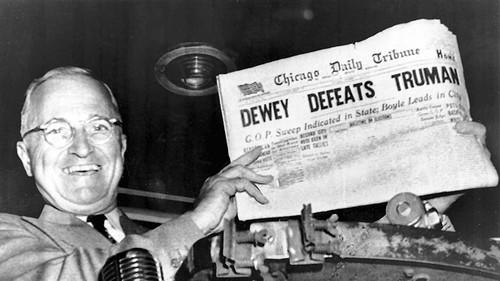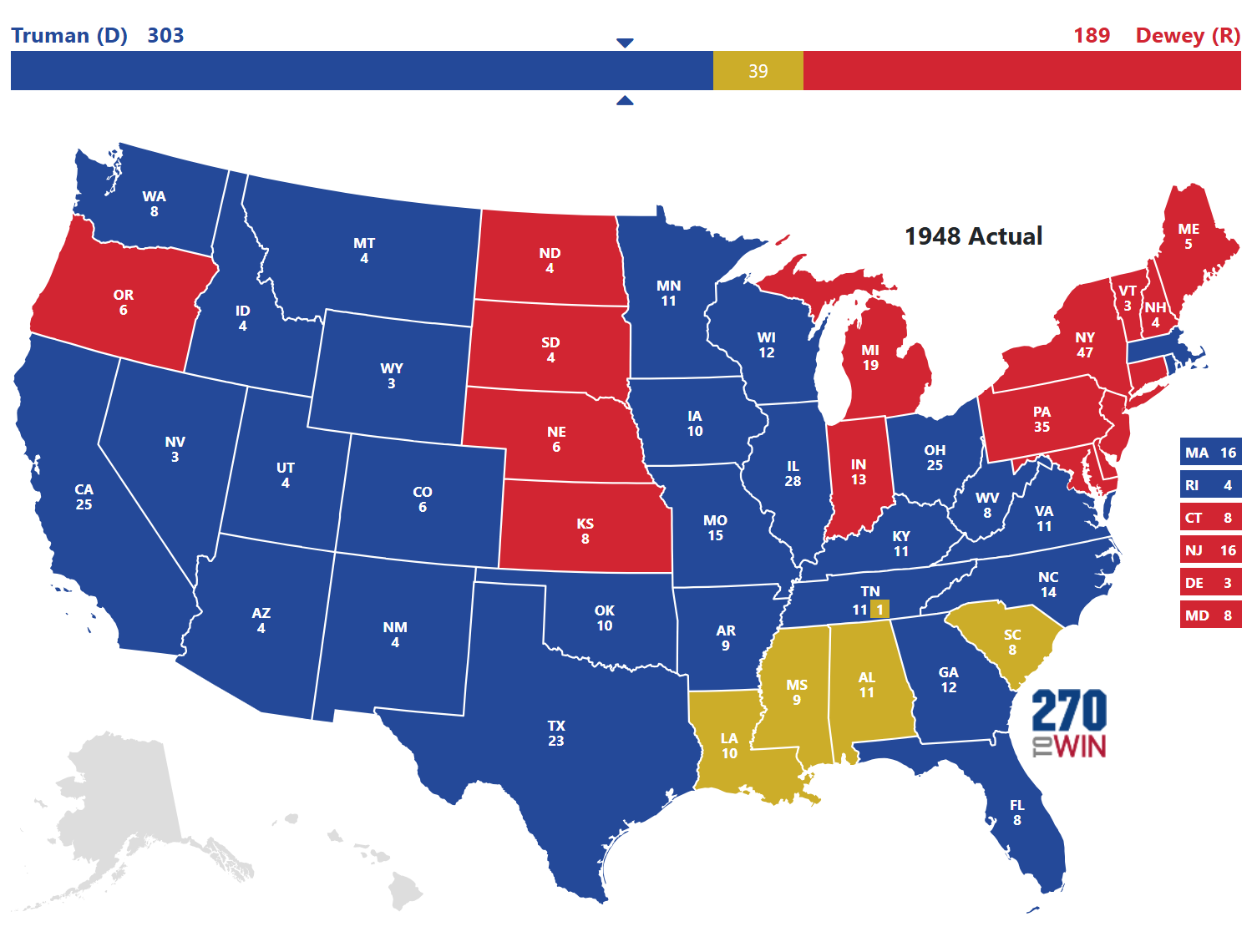The
election of 1948 is often considered a landmark election in the history of the
United States. Under Franklin Roosevelt, the Democrats had won landslide
elections in 1932, 1936, 1940, and 1944. But tragedy struck the United States
when Roosevelt died in April of 1945. The war in Europe was weeks away from
concluding, and Adolf Hitler himself would commit suicide before the month was
out, but the war with Japan raged on. Roosevelt’s death caused his Vice
President, a former Senator from Missouri named Harry Truman, to step into the
Oval Office and become the 33rd President.
Truman
represents a few unique points in American history. He is the only man to have
been the third Vice President to a single President. He is the only President
who fought in the First World War. He was the last President to have not gone
to college. Cool and moderate, Truman had been chosen as a compromise when
Roosevelt ran for re-election in 1944. Those closest to Roosevelt knew of his
ill health, and two camps emerged in the Democratic party over whether or not to keep on the pro labor
and pro civil rights Vice President Henry Wallace, or to replace him with Senator James
Byrnes, a more conservative southerner. Truman was chosen to placate both the
Wallace supporters and Byrnes supporters, and was placed on the ballot with
much enthusiasm. Together, Truman and Roosevelt would go on to win thirty six
states in the 1944 election, handily defeating Governor Thomas Dewey of New
York.
Once
elected, however, Truman was never very close to Roosevelt, and seemed to lack
any individual popularity. In fact Roosevelt never told Truman about the atomic
bombs that Truman would late authorize to be used against Japan. Truman may
have been president during the wars end, but he was never able to claim any
credit for it. He was able to help institute the Marshall Plan, but another
man's name was attached to the project so again, Truman wasn’t able to claim
credit. When he introduced a health care bill to Congress after the war's end, it
was shot down as well. Truman was seen as an accidental President, only there
because of Roosevelt’s death. Things only got worse in 1946 when the
Republicans gained majorities in both the Senate and House of Representatives.
This Congress refused to work with Truman, and went so far as to start repealing
legislation from Franklin Roosevelt’s New Deal. Truman used his Presidential
Veto to prevent any wholesale repealing, but it seemed like he was done.
So in 1948
the Republicans believed that they would easily win the presidential election.
Thomas Dewey, who had run against Roosevelt in 1944, was again their nominee.
The Democrats failed to rally around Truman and split into three parties.
Strom Thurmond, a southern segregationist, feared that the Democrats might
force integration, so he formed a political party called the Dixiecrats. Former
Vice President Henry Wallace, fearing that the democrats wouldn’t do enough for civil rights, formed a
political party called the Progressive Party. The conventional wisdom was that
these parties would siphon off votes from the Democrats, and the polling seemed
to confirm this.

Election
day in 1948 fell on November 2. Truman had run a low money campaign, whereas
Dewey’s campaign had raised substantial sums. Truman’s inner circle had already
begun accepting other jobs, resigned to the fact that their man would lose.
Truman slept through the night, whereas Dewey stayed up to watch the returns.
The Chicago Daily Tribune was so sure
that Dewey would win that they went ahead and printed their newspapers with the
headline "Dewey Defeats Truman". As the
results came in, Truman took the lead in votes, a lead that he would never
lose. Surprise! Harry Truman won by a comfortable three point margin – his
detractors had underestimated him, and he would remain President for another four
years.

So interesting to think about different opinions on segregation as an important issue in an election almost 70 years ago, when in this year's election segregation between citizens and immigrants is a live issue.
ReplyDeleteYes Phil, and the segregation between whites and blacks also still remains an issue to this day, although you won't hear politicians discussing it.
Delete